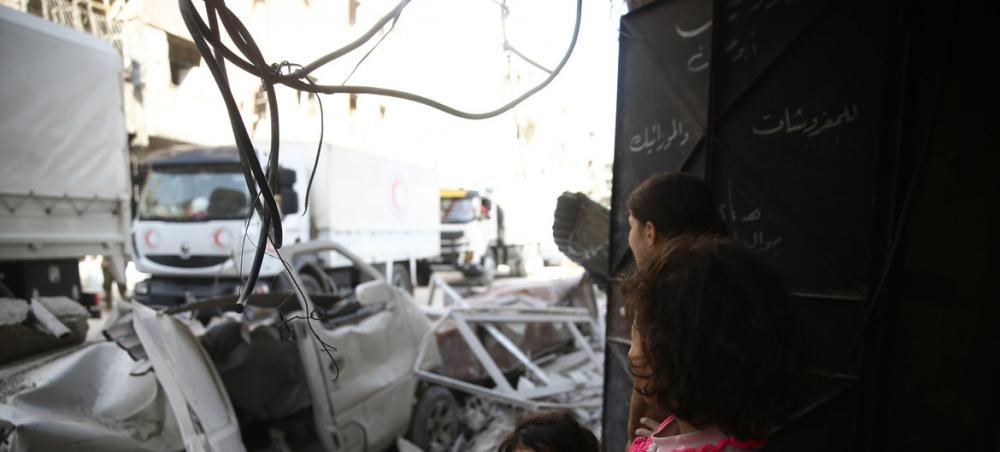Just Earth News | @justearthnews | 10 Mar 2018

UNICEF/Khabieh: Residents watch as vehicles forming part of a joint UNICEF, UN and Syrian Arab Red Crescent 46-truck convoy transporting food aid, as well as health and nutrition supplies, drives past in Douma, Eastern Ghouta, Syria.
Ghouta: The Syrian rebel-held enclave has been split in three after the government forces captured a major town in Eastern Ghouta, media reports said on Saturday.
The move by the Syrian army is a step forward in its effort to take back rebel-held Eastern Ghouta area in Syria.
The Syrian Observatory for Human Rights (SOHR) told media that the town of Mesraba has been captured by the government forces on Saturday.
The town is located 10km east of Damascus.
The forces have reportedly started advancing towards surrounding areas after capturing Mesraba.
The UK-based monitor told Al Jazeera that Eastern Ghouta had been divided into three parts - Douma and its surroundings, Harasta in the west, and the rest of the towns further south.
The latest offensive by the government was launched in Eastern Ghouta on Feb 25.
According to the Observatory, 976 people have been killed since the launch of the offensive.
The Syrian American Medical Society (SAMS) told Al Jazeera that at least 49 people, including 14 women and 10 children, were killed on Friday, and a further 200 were wounded.
Syrian President Bashar al-Assad and Russia are aiming to end the rebel rule over the civilians staying in the area with the campaign launched recently.
The United Nations and partners on Friday reached the Syrian city of Douma in Eastern Ghouta to complete distribution of food aid after intense shelling cut short deliveries to the war-torn enclave.
“The United Nations and our partners were able to go back into Douma today to deliver the remaining food assistance,” said Marwa Awad, Communications Officer of the World Food Programme (WFP), from the conflict-ravaged country’s capital, Damascus.
The assistance consisted of food baskets and wheat flour bags prepared by the WFP and the International Committee of the Red Cross (ICRC).
The WFP and its partners, namely ICRC and the Syrian Arab Red Crescent, “look forward to our ability to enter again in the future to continue delivering the much-needed humanitarian and food assistance to the people inside Eastern Ghouta,” she added, calling on all parties to the conflict to grant humanitarians safe access to deliver the much-needed food and other assistance.
Meanwhile at UN Headquarters in New York, Spokesman Stéphane Dujarric told reporters that while the convoy was underway, shelling occurred in the proximity of operations, despite prior assurances of safety from all parties.
Despite such risks, today’s delivery completed the planned food relief for 27,500 people, along with health and nutrition items. The UN is waiting for access authorization to cover all 70,000 people in Douma that was initially approved by the Syrian authorities.
In Geneva, the World Health Organization (WHO) warned that there has been a marked increase in violent attacks on health care in Syria.
“Every attack on health represents a loss that shatters families and communities and ripples through health systems. Health workers and health facilities are not a target. It has to stop,” Christian Lindmeier, WHO communication officer, told reporters.
According to a monthly report from the health cluster based in Gaziantep, Turkey, 43 incidents of violence against health care facilities, services and workers were reported in February, of which 39 were verified by external monitors and four are still being verified.
That compares to 31 incidents last month, of which 28 were verified.
In all, the 67 verified attacks on health facilities and workers in the first two months of this year amount to more than 50 per cent of verified attacks in all of 2017, which totaled 112.
Of February’s verified incidents, 28 were in eastern Ghouta, 10 in Idleb and one in Homs. The attacks targeted 20 hospitals, 16 health facilities, two ambulance stations and one medical supplies warehouse.
These unacceptable attacks resulted in the deaths of 19 people, among them four health workers. The attacks also left 28 people injured, seven of them medical staff, he said.
Image: UNICEF/Khabieh: Residents watch as vehicles forming part of a joint UNICEF, UN and Syrian Arab Red Crescent 46-truck convoy transporting food aid, as well as health and nutrition supplies, drives past in Douma, Eastern Ghouta, Syria.